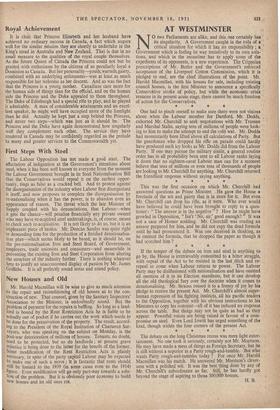N . two Parliaments are alike, and this., one certainly has
its singularity. A Government caught in the toils of a' critical situation for which it has no responsibility ; a Government which is feeling its way tentatively to its own solu- tions, and which in the meantime has to apply some of the expedients of its opponents, is a new experience. The Crippsian prescriptions of Mr. Butler and the Government's enforced acceptance of the Liverpool Cotton Commission, which it is pledged to end, are the chief illustrations of the point. Mr. Harold Macmillan, with his houses for sale, including existing council houses, is the first Minister to announce a specifically Conservative stroke of policy, but while the economic crisis remains in its present acute stage, there cannot be much freedom of action for the Conservatives.
* * * * One had to pinch oneself to make sure there were not visions about when the Labour member for Dartford, Mr. Dodds, exhorted Mr. Churchill to seek negotiations with Mr. Truman and Marshal Stalin, saying tens of millions of people were look- ing to him to make the attempt to end the cold war. Mr. Dodds had momentarily been lifted above all calculations of Party. But the guardsman who dropped his rifle on parade could hardly have produced such icy looks as Mr. Dodds did from the Labour Party. If one may pursue the military simile, a general routine order has in all probability been sent to all Labour ranks laying it down that no eighteen-carat Labour man can for a moment believe that tens of millions or even tens of thousands of people are looking to Mr. Churchill for anything. Mr. Churchill returned the friendliest response without saying anything.
* * * * This was the first occasion on which Mr. Churchill had answered questions as Prime Minister. He gave the House a foretaste of the wit and gaiety that is in store for it. But even Mr. Churchill can drop his rifle, as it were. Who ever would have believed he could have been brought to reply to a ques- tioner: "The answer is in the negative" ? How he might have growled in Opposition, "Isn't 'No, sir,' good enough? It was not a case of Horner nodding. Mr. Churchill was reading an answer prepared for him, and he did not espy the dead formula until he had pronounced it. Was one deceived in thinking, as he emitted the formula, that he dropped the paper as though it had scorched him ?
* * * * If the temper of the debate on iron and steel is anything to go by, the House is irretrievably committed to a bitter struggle, with repeal of the Act to be resisted in the last .ditch and re- repeal to come when Labour returns to power. The Labour Party may be disillusioned with nationalisation and have omitted all mention of it in its Election manifesto, but it can develop all the old theological fury over the doctrine when it comes to denationalising. Mr. Strauss roused it to a frenzy of joy by his pledge to restore the present Act. Mr. Churchill's almost super- human repression of his fighting instincts, all his pacific tenders to the Opposition, together with his obvious instructions to his Ministers to copy his restraint—all of it has induced no response across the table. But things may not be quite as bad as they appear. Powerful voices are being raised in favour of a com- promise on steel. Even Lord Jowitt has urged something of the kind, though within the four corners of the present Act. * * * * 1 The debate on the long Christmas recess was mere light enter- tainment. No one took it seriously, certainly not Mr. Morrison. He may have made a mess of things as Foreign Secretary, but he is still without a superior in a Party rough-and-tumble. But who ) wants Party rough-and-tumbles today ? For once Mr. Harold Macmillan was his match. He answered Mr. Morrison's clever- ness with a polished wit. It was the best thing done by any of Mr. Churchill's subordinates so far. Still, he has hardly got beyond the stage of aspiring to thosi 300,000 houses. H. B.














































































 Previous page
Previous page